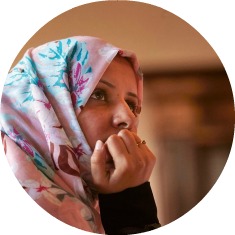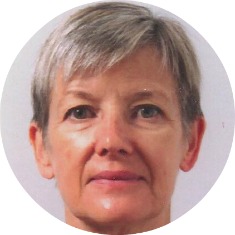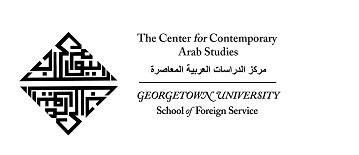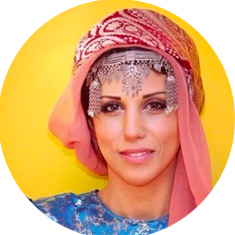CCAS: Thank you for joining us. We are really excited to have Sama’a Al-Hamdani stay with us following her event talking about a lot of the current crisis in the gulf, and so we’re just going to follow up on a lot of the points that you made during the event. Again, thank you so much for joining us this afternoon.
SA: Thank you it was a pleasure and it was important to speak at such a reputable and amazing home in the District of Columbia.
CCAS: We we’re really happy to amplify, as I mentioned earlier, amplify a perspective that we aren’t really used to hear. So we’re at the Center for Contemporary Arab Studies at Georgetown University and the first thing we wanted to hear more from you about is the tendency a lot of these institutions which we’re kind of having conversations about crisis in the Arab world and contemporary Arab world specifically. And often Yemen is left out of those discourses.
SA: The reason that Yemen is not addressed directly is because the conversation about Yemen is hijacked into either a proxy war, so it’s either a proxy war there and some factions are pro Saudi Arabia and others are pro Iran, which I think really down plays what’s going on in Yemen and reduces the country as a whole to being just one side vs. the other and that’s not fair to Yeminis who are at this point 29 million individuals. It’s also due to lack of understanding of Yemen. Yemen is a remote country that a lot of people in the west don’t visit. They don’t hear about it. They’re not familiar with it. And so to understand it, what they do is they compare it to neighboring countries. And I think they struggle with that because Yemen is not like Saudi Arabia entirely because they don’t have the amount of wealth that Saudi Arabia has. They’re not like they’re Gulf neighbors because their economy is very bad. They are not like the Levant area, they’re not like Jordan or Lebanon because they don’t have their experience and they’re also not like Egypt because they’re very remote from that. But Yemen continues to be important because that geographical location. It is a big country. It is a land with, again, a lot of individuals. And they continue to be influenced by the politics that are happening in the region. And so, Yemen geographically is important. To have influence is important. They’re important because obviously Saudi Arabia is very scared of Iranian influence there because it allows access to Saudi Arabia. I think we are going to continue to see some misunderstanding about Yemen unless authors put real effort into understanding it. And there really are some people who have been explaining and put a lot of effort into understanding what Yemen is. I would say the New York Times, The Guardian, and some other websites do a decent job covering Yemen. I would say there isn’t enough coverage. And by that I mean that there is so much going on in the world that how do you dedicate how much you mention Yemen? Now the problem with Yemen is that, what they’re facing today is a massive humanitarian crisis. That’s what needs our attention in the world the most. So we have 29 million people. And then we have more than half, I would say 70% of the population, that is in dyer need of food assistance. 18 million people, which is again, a huge number of the 29 million people, that don’t have access to clean water or sanitation. So as humanity, as humans we need to kind of look at that and kind of do something about it. But at the same time it seems that we have the statistics we’ve been telling people that this was going to happen, but ultimately I think political actors and writers understand that the solution to this ultimately comes down to the Saudi Arabian will. Or Yemen, what they want to happen in Yemen, they have a lot of control and say in what happens there.
CCAS: You mentioned the humanitarian crisis and all of these different components because you mentioned, for example, lack of sanitation and access to clean access to water, which has been a huge reason why cholera has been so devastating and widespread. I wonder if you can talk about how that’s exacerbated by the fact that a lot of internally displaced persons and refugees can’t actually freely move to find the location in which they might have better chances of accessing those needed resources and care.
SA: So water in Yemen has always been a problem. When I lived there it was really hard to get clean water and a lot of times as a child we resorted to boiling a mass amount of water in pots to make sure that they are clean before we drank them. And so it’s always kind of been a problem, but is was one that the country was working on fixing. So you don’t expect the country to take such a downturn in whatever they were improving on and so water has always been an issue, but not just because of the sanitation, but because we also don’t have water in Yemen. The capital at Sana’a is projected to run out of water. They actually said that by 2020 it’d be the first capital in the world to be out of water. Luckily we have been somehow pushing the state back five years, five years, every fiver years, but at the same time it just shows you the dire situation the people are living in. if you don’t have access to clean water then what happens from there since water is the source of life. As in Arabic ma - -- - and then it’s a problem because Yeminis are not refugees the same way that way that Syrians are refugees. Right? There aren’t countries that are willing to host Yeminis. And so a lot of Yeminis flee for medical reasons a lot of the refugee populations actually exist in pockets in Eygpt, in Jordan, in Djibouti, and then you have, which is kind of ironic, people in Djibouti and Somalia would flee from their own countries to Yemen to then kind of transition somewhere else, but now you have this reverse refugee operation kind of going back to these countries that people are escaping from. And so you have that biggest crisis of all is the internally displaced people because there is nowhere for them to go. There aren’t specific buildings that are set up or mechanisms in place to host these people. No international agency has been able to fully control what happens with these IDPs. Some have attempted to go back to their homes, but failed to do so successfully. A lot of people had to just leave either from fighting or bombing or invasions and so generally speaking those people are the ones that deserve our attention the most because we don’t know what their experience is like. There is nothing there to help them and they’re in constant movement. And statistically speaking, those IDPs tend to be, the majority of them tend to be young girls so as a woman, terrifying to think that the majority of those are young girls who then grow up to be women, who ,just right of the bat, don’t have a future.
CCAS: I find this really interesting too, and I find that given the situation and how dire it’s become and especially how many youths have been so adversely impacted by this that we’ve also seen this use of really interesting media as a way to amplify the Yemini experience both on the ground and in the diaspora especially for those who are in the diaspora and not by choice and so you had written a few years ago about art as a way to kind of get that narrative out there. And I wonder perhaps if you could speak to that angle of using art whether its filmmaking whether its graffiti on walls or whatever kind of media exists. How people use that as a means of resistance.
SA: I think first of all that that’s and excellent question and something that we don’t look at enough. There are a lot of Yemini artists still trying to pursue their art. The article that I wrote about before was about Nourat Suraya and him trying to remember missing individuals by making stencils of their faces and names so that we don’t forget them. I would say that Nourat and other artists like him have since lessened their activities, because it’s really threatening for them to do any kind of political artwork. So the realities are going to be different based on what part of Yemen you’re from. If you’re in the south, you would have kind of an easier time walking around with a camera but you are bound to go anywhere and people will ask you “why do you have a camera?” “Why are you filming?” “You’re not allowed to film. Can we see the film that you have?” A lot of my friends that are journalists and filmmakers they would have their tapes kind of removed. There is a Yemeni director by the name Sara’a Ezhat that filmed a lot of the first part of the war in Yemen and she went to Egypt where she, after filming what happened in the war, suffered slightly with post traumatic stress disorder based on there experience. I’m not sure what’s happening with that film, but I feel that a lot of people would not want that film to come out. This is still active warfare and so until there are clear losers and winners, everyone that is involved in this war is going to make sure that artists and writers and thinkers are silenced. In the north of Yemen, you have absolute Houthi Control and after since they killed former President Ali Abdula Saleh you have them highly cautious and paranoid of everything that is going on around them. They are afraid of betrayal and it has come to the point where they listen in on phone calls, they check houses if needs be. And so if you’re an artist living there, it’s hard for you to have that freedom of speech and expression when you’re constantly being silenced from each side. You know, ultimately you have this going on on the ground, but then on a larger level when you’re on the diaspora, if you express a point of view that is not satisfactory, lets say to the Arab coalition, or to the legitimate government of Yemen that is based in Riyad or to the native population that you’re – let’s say that you’re now part of the diaspora and are now part of the community that’s in Virginia and your community doesn’t agree with you, you’ll then find harassment in the sense that “oh you must be working for so and so or you must be working for so and so to say this” and so I think for artists it’s a really hard time, but I have no doubt that artists are continuing to express themselves one way or another. Artists are just, again, are just extremely sensitive people. And not just artists but generally speaking, when I talk to people on the ground there is just that sense of depression and at the same time depression but at the same time wanting and hoping and almost in the back of their minds knowing that it has to get better, that is somehow has to get better. And the role that international community and organizations around the world need to protect these people. They need to allow them to participate in what’s going on because ultimately they are not political actors and their assessment might be even fairer and more human than that of anybody else.
CCAS: Well in closing I think that perhaps this is a really good opportunity to then tell our viewers and our audience here in the United States, in the Washington DC area, and in parts of the United States and the Globe how they can be involved. What can they do, whether it’s in their schools, in their programs, in their social justice organizing, how can people work to amplify the perspectives that you’ve spoken about and make sure that Yemen is not forgotten and that the plight of Yemeni people is not forgotten or reduced to some political pawn in a greater scheme.
SA: That’s a big question and there’re many answers to it. I think everything in the world is starting to operate on a supply and demand basis. If you demand information, people will start writing about it. So in that sense I would say start reading. Read. Don’t just have someone that you read for and that you follow their ideas. I would say read from all sides and formulate a good understanding of what’s going on based on a variety of readings. Unfortunately when it comes to countries like Yemen that are harder to understand, a lot of people would then find specific person who they agree with on other topics and then they would take his opinion or her opinion on Yemen and then follow that blindly. I think knowledge is key. Get yourself educated. Know the facts. Know the facts from several sources and then demand information. Demand it from the state or the community. Demand it as a subject. Talk about it. Talk about what you read. But ultimately we are talking about something really big here and something that is out of the hands of the average citizen. Ultimately to stop the war in Yemen you would have to have political influence and you would have to have the Saudi approval of some sort because it is my belief that the Saudi government is entirely capable to bring this war to an end or to keep it going. Some would say it’s in the hands of the Houthis and I think that it is in the hands of both of them of course, but I think that Saudi is pretty much in charge. I don’t know what to say except to keep Yemenis in our hearts and minds because they are suffering and they are struggling. This is real. It’s not just a remote place that’s far away. The people of Yemen, imagine them humans that look just like you. Their little children look just like your little nephews and nieces and it’s just not a respectable or dignified life that they are living at the moment. There is no where for them to go and ultimately it doesn’t look good. I think that Humanitarian wise, your going to agree and disagree with a lot of people but one thing is for sure and that is the people there are suffering and that needs to come to an end somehow, and that needs to be elevated in the moment.
CCAS: Well thank you for elevating those perspectives and for taking the time to sit with us today and join us here at our event. Again we’re here at the Center for Contemporary Arab Studies. With Sama’a Al-Hamdani. And you can follow her at her blog at that she founded Yeminiyati.com. There’s a lot of great content there a lot of great resources that you can use to educate yourselves and learn about what’s Yemen and hopefully find a way to get involved. Thank you again.
SA: Thank you.












